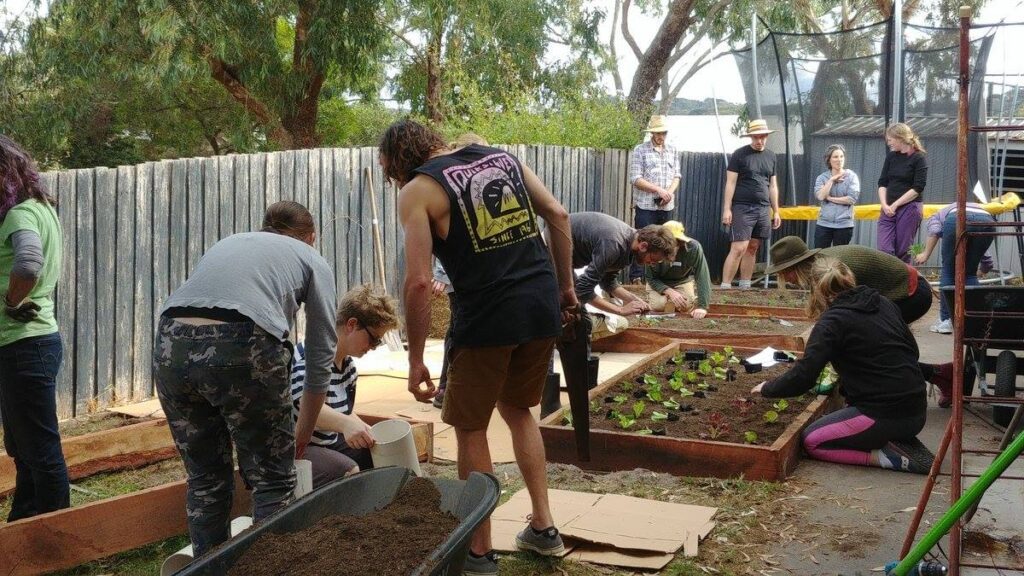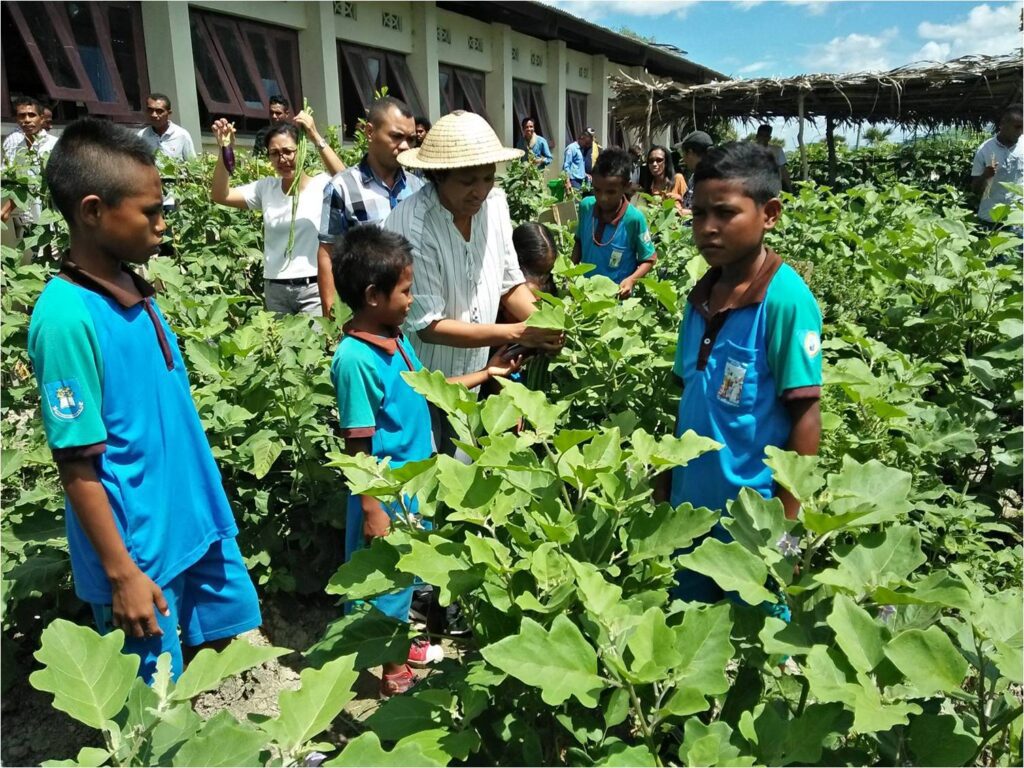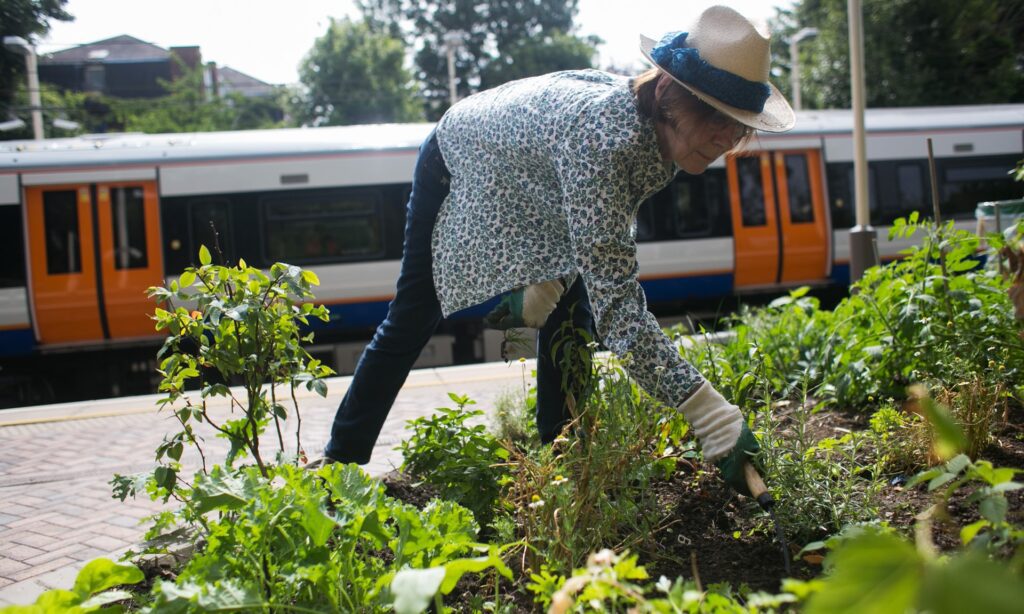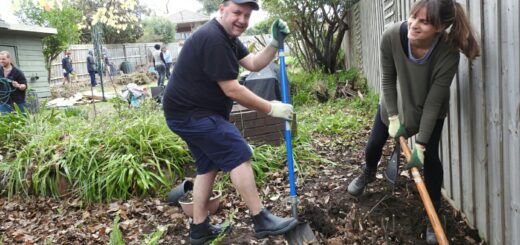Avocados, rewilding and revisiting blitzes
Winter is now definitely here, and getting out of bed is harder than ever. It’s been great hearing the rain hitting the roof at nights, and the plants are loving it. The brassicas are thriving, the snowpeas are racing up the trellis, and even the garlic is shooting skyward!
This month we’ve got two new blitzes to get on down to, plus Pete the Permie tells us about all things avocado. To celebrate we’ve given the song of the month to World Champion with their electronic pop track Avocado Galaxy.
Permablitz News
A fond farewell to Hermann, and welcoming the new wave!

May 2018: from left to right: Lyndon, Russell, Hermann, Kat, Leanne, Adrian, Charlotte and Joel.
For the last four years or more, Hermann has been a constant in the wonderful world of Permablitz – designing blitzes, supporting new designers, leading pre-blitz warm-ups, organising documenters – even filling in as a temporary innie for two years! But now he’s off on a multi-continental adventure, and he will be terribly missed.
On the bright side, we’ve had a wonderful new group of people join us in recent months – Joel and Leanne bring their enthusiasm and knowledge to the group, and Charlotte has taken over the innie role with style. Our team has grown by three and is all the more awesome for it.
Find out more about the Collective here!
Permablitz #204 - Jan Juc

It was a day of sun, surf, sand and soil – and a hardy group of almost 20 volunteers (and trusty designers Goshen & Fiona) transformed Sonia’s back yard into a low-maintenance veggie-ready oasis!
Check out all the action here!
Permablitz Revisited: Keilor – 2 years later

Strawberries - yum!
It’s been two years since Permablitz #178, and Mara and Audrey’s permaculture design is definitely working for Brett’s family: it provides plenty of food, enjoyment in the garden, yet not so much work that it interferes with other aspects of life.
Check out how the design has worked here!
Hero of the Month
Avocado

This month we’re revisiting the wonderful avocado – this time with growing tips from Pete the Permie!
Get the lowdown on which varieties do best in Melbourne climates, as well as what you need to do to get the most from your avocado tree.
To read more about this amazing tree, click here!
Beets and Pieces
Supporting permaculture education in primary schools
Timor Leste is working towards food security and food sovereignty by introducing permaculture into the school curriculum. Food gardens established in primary schools teach life-long skills, produce food for school lunches and become a nexus for spreading skills to the wider community, enhancing production and efficient resource use in home gardens.

The program is the brainchild of Ego Lemos, founder and Director of the not for profit organisation Permatil (Permaculture Timor Leste) and co-author of The Tropical Permaculture Guidebook. You can read all about Ego in this recent article.
As well as music, performance and art he managed to incorporate permaculture and cuisine. With some tactful lobbying, Ego convinced the Education Department to approve a permaculture syllabus – and now permaculture is a compulsory subject for all Timorese kids in grades 3 – 6.
Despite inclusion in the curriculum, the Timoreses government has not provided any funding for implementation of the Permaculture in Schools program. As a result, Ego and Permatil, who deliver the program, have had to find donors to fund the program’s implementation, school by school. The program began with a pilot program in two schools in late 2015, and following their success, has gradually expanded to around 178 schools now running the program. Funding has mostly come from small NGO’s including Australian – Timor Leste Friendship groups.
So far around $7,000 has been raised towards the approx. $10,000 is needed to do a proper evaluation of the Permaculture in Schools project – but there’s not much time left. Can you chip in any amount to help get it across the line?
You can make a tax deductible donation via Permaculture Australia‘s tax deductible arm, Permafund.
To find out more about Ego’s work in Timor Leste primary schools (and how you can help) read the full article here!
How to rewild your garden
Rewilding excites people with its images of wolves and ambition to return entire landscapes to nature as humans withdraw after centuries of domination. But the grandeur of rewilding can also make the concept seem remote or irrelevant to people living ever more urban lives.

A community garden at a train station in London.
Photograph: Kristian Buus
To declare we are rewilding our garden, or window box, is probably a contradiction in terms and risks cheapening this important conservation concept. But there are principles of rewilding – stepping back and allowing natural processes to occur, and encouraging wild plants and insects – which we can all embrace. The most relevant rewilding idea for us urban beings? Let go, and reduce our micromanagement of whatever small patch of earth we own, rent or enjoy and influence.
1. Rewild ourselves
The first step is to change our way of seeing. I’ve struggled with “weedy” patios and “rank” lawns for a few years but I now see “tidy” gardens as they are for every other living species: desolate and hostile, stripped of the natural abundance and vigour that our soils and climate naturally serve up, even in the heart of a city.
2. Discard all pesticides, weedkillers, slug pellets and fertilisers
We’re persuaded to apply far too many chemicals to our gardens and these are killing the insects upon which human life ultimately depends.
Read the full article in The Guardian here.
In The Garden
There’s not much planting to do this month, but there’s still a bit you can do around the garden. Any fallen leaves can become an excellent source of mulch – if you don’t have any in your own garden, don’t worry – many suburbs are literally covered in leaves right now! The best way to use them is to put them in a pile in your yard before running them over them with a mower – or even a whipper snipper will help. This will dramatically increase the breakdown process.
It’s also an excellent time to divide and plant perennials. Bare-root season is almost upon us, so have a think about where you can squeeze in another fruit tree – you know you can never have enough!
Seeds that do well in June include…
- Broad Beans
- Garlic
- Lettuce
- Mustard Greens
- Onions
- Radish
- Shallot bulbs
- Snow Peas
- Strawberry runners
- Strawberry (seeds)
Remember: some seeds do better starting off in punnets, some in pots and some in the ground. To get the best from your seedlings be sure to check the best methods first!



















